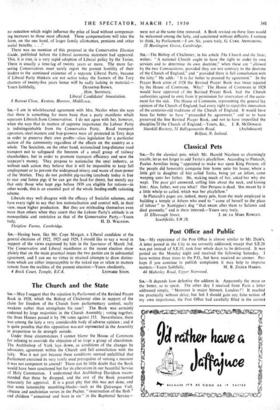Classical Pets
SIR,—To the classical pets, which Mr. Harold Nicolson so charmingly recalls, let us not forget to add Tertia's playfellow. According to Plutarch, Paulus Aemilius being " appointed to make war upon King Perseus, all the people did honorably companie him home unto his house, where a little girl (a daughter of his) called Tertia, being yet an infant, came weeping unto her father. He, making much of her, asked her why she wept. The poor girl answered, coiling him about the neck, and kissing him: Alas, father, wot you what? Our Perseus is dead. She meant by it a little whelp so called, which was her playfellow."
In Plutarch's pages are, indeed, many pets, from the mule employed in building a temple at Athens who used to " come of herself to the place of labour" to Xantippus's dog " that swam after them to Salamis and died presently," and is there interred.—Yours very truly,


































 Previous page
Previous page